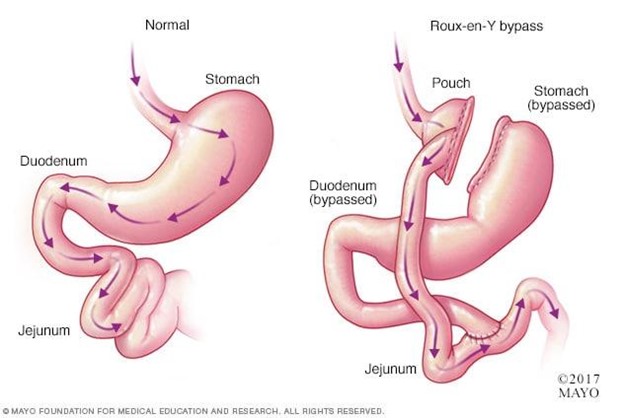A nurse is providing teaching to a client who has dumping syndrome due to gastric bypass surgery.
Which of the following dietary modifications should the nurse recommend?
Eat small, frequent meals throughout the day
Drink fluids with meals rather than between meals
Increase intake of simple carbohydrates such as fruit juice
Avoid foods that are high in fat and protein.
The Correct Answer is A
Eat small, frequent meals throughout the day. This will help prevent dumping syndrome, which is a condition that occurs when food moves too fast from the stomach to the duodenum, causing symptoms such as abdominal cramps, diarrhea, nausea, vomiting, flushing, dizziness and rapid heart rate. Eating small, frequent meals will reduce the amount of food that enters the small intestine at once and slow down gastric emptying.
Choice B is wrong because drinking fluids with meals rather than between meals will increase the volume of food that enters the small intestine and worsen dumping syndrome symptoms. Fluids should be consumed at least 30 minutes after a meal.
Choice C is wrong because increasing intake of simple carbohydrates such as fruit juice will cause a rapid rise and fall of blood sugar levels, leading to late dumping syndrome symptoms such as sweating, hunger, low blood sugar, fatigue, dizziness and weakness. Simple carbohydrates should be avoided and replaced with complex carbohydrates such as whole grains, fruits and vegetables.
Choice D is wrong because avoiding foods that are high in fat and protein will not help prevent dumping syndrome. In fact, fat and protein can slow down gastric emptying and stabilize blood sugar levels. A moderate amount of fat and protein should be included in each meal. However, too much fat at one time can have the opposite effect and trigger dumping syndrome symptoms.

Nursing Test Bank
Naxlex Comprehensive Predictor Exams
Related Questions
Correct Answer is A
Explanation
Breasts are soft without engorgement or leakage.This indicates that lactation suppression has been successful and the woman is not experiencing any discomfort or risk of infection from milk accumulation.
Breasts are firm with mild tenderness or leakage is wrong because it suggests that lactation is still occurring and the woman may need to express some milk for comfort or use other non-pharmacological methods to suppress it.
Breasts are hard with moderate pain or leakage is wrong because it indicates that the woman is suffering from breast engorgement, which can lead to mastitis if not treated.The woman may need pharmacological intervention to suppress lactation and relieve pain.
Breasts are swollen with severe pain or leakage is wrong because it shows that the woman has developed mastitis, which is a bacterial infection of the breast tissue that requires antibiotics and analgesics.The woman may also need to drain the infected breast by expressing milk or using a pump.
Normal ranges for lactation suppression vary depending on the individual and the method used.Generally, lactation suppression can take from a few days to a few weeks.
Correct Answer is B
Explanation
Runs with a wide stance.This indicates normal gross motor development for an 18-month-old toddler.Gross motor skills are the abilities to use large muscles for movements such as walking, running, jumping, and climbing.
Choice A is wrong because walking up and down stairs with assistance is a skill that most toddlers can do by 24 months.
Choice C is wrong because kicking a ball forward without falling is a skill that most toddlers can do by 24 months.
Choice D is wrong because jumping in place with both feet is a skill that most toddlers can do by 30 months.
Whether you are a student looking to ace your exams or a practicing nurse seeking to enhance your expertise , our nursing education contents will empower you with the confidence and competence to make a difference in the lives of patients and become a respected leader in the healthcare field.
Visit Naxlex, invest in your future and unlock endless possibilities with our unparalleled nursing education contents today
Report Wrong Answer on the Current Question
Do you disagree with the answer? If yes, what is your expected answer? Explain.
Kindly be descriptive with the issue you are facing.
